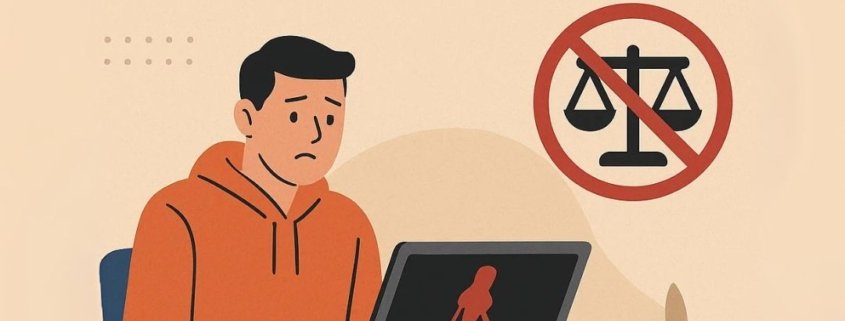Is Watching Porn Legal in India? A Complete Legal Guide by LEGAL ASSIST
The digital age has transformed how people access content online. With smartphones and high-speed internet, pornographic material is just a click away. But this raises an important question: Is watching porn legal in India?
The answer is more complex than a simple yes or no. While Indian laws are strict about obscenity and child pornography, the courts have recognized that private viewing may fall under personal freedom rights.
Understanding Pornography vs Obscenity
Many people confuse pornography with obscenity, but they are legally different concepts. Pornography refers to explicit sexual content created to arouse desire, while obscenity covers anything that violates public decency standards.
The key difference lies in legal treatment. Not all pornography is automatically obscene under Indian law. Courts now use community standards rather than older, stricter tests to determine what counts as obscene material.
The Digital Revolution and Its Impact
Statistics show that pornographic content makes up nearly 30% of all internet material. By age 18, about 90% of boys and 60% of girls in India have been exposed to online pornography. This widespread access has created new legal challenges that lawmakers and courts must address.
The rise of social media, messaging apps, and streaming platforms has made content sharing easier than ever. However, this also means that illegal distribution happens more frequently, creating situations where people unknowingly break the law.
What Indian Laws Actually Say
India doesn’t have one single law that bans all pornography. Instead, several different acts cover various aspects:
Indian Penal Code provisions make it illegal to sell, distribute, or publicly display obscene material. The new Bharatiya Nyaya Sanhita has added stronger protections, making it a crime to show pornography to someone without their consent.
Information Technology Act covers online activities. Publishing obscene content online can result in three years imprisonment and heavy fines. The law is particularly strict about child pornography, making even viewing such content a punishable offense.
POCSO Act provides special protection for children. Any involvement with child pornography – whether creating, storing, or viewing – is treated as a serious crime with harsh punishments.
What Courts Have Decided
Indian courts have evolved in their thinking about pornography over the decades. The Supreme Court moved away from very strict Victorian-era standards to more modern approaches that consider current social values.
In several important cases, courts have distinguished between private consumption and public distribution. The landmark observation came when the Supreme Court noted that watching pornography privately at home might fall under the constitutional right to privacy.
However, courts have been absolutely clear about certain boundaries. Child pornography is always illegal, regardless of circumstances. Public viewing, forced viewing, and distribution remain criminal offenses with serious consequences.
When Legal Help Becomes Necessary
If you find yourself facing legal issues related to pornography laws, it’s crucial to seek professional guidance. Whether dealing with cybercrime charges, privacy violations, or defamation cases, experienced legal representation can make all the difference.
Top Lawyers For Property Case in Delhi at LEGAL ASSIST understand that legal troubles can extend beyond property matters. Our Best Delhi Lawyers for Civil Case have extensive experience handling sensitive digital content cases that require discretion and expertise.
When reputation and freedom are at stake, having the right legal team matters. LEGAL ASSIST’s Top Lawyers For Property Case in Delhi bring the same attention to detail and client protection to all types of legal challenges, including those involving digital content and privacy rights.
The Clear Boundaries: What’s Legal and What’s Not
Understanding the law helps you stay on the right side of legal boundaries:
Generally Legal:
- Watching adult pornography privately in your own home
- Personal consumption that doesn’t harm others or violate consent
Clearly Illegal:
- Creating or distributing pornographic content without proper permissions
- Watching pornography in public spaces
- Forcing anyone to view pornographic material
- Any involvement with child pornography
- Sharing pornographic links through messaging apps or social media
The Role of Internet Service Providers
Internet companies and platforms have specific responsibilities under Indian law. They must moderate illegal content and assist government blocking efforts. However, they’re not automatically liable for user-uploaded content if they respond promptly to removal notices.
This system creates a balance between platform freedom and content control, though enforcement challenges remain significant due to technical workarounds like VPNs and proxy servers.
Moving Forward: Education and Awareness
The real solution to pornography-related legal and social issues lies in better education and awareness. Understanding legal boundaries, recognizing consent requirements, and promoting healthy digital habits are essential steps.
Parents, educators, and society must engage in open discussions about digital content consumption, legal responsibilities, and the difference between personal freedom and public responsibility.
Conclusion: Navigating Complex Legal Territory
So, is watching porn legal in India? The answer depends entirely on the circumstances. Private adult content consumption is generally not criminalized, but the boundaries around creation, distribution, and public viewing remain strict.
Child pornography is always illegal, regardless of circumstances. Distribution, public viewing, and non-consensual sharing carry serious legal consequences that can affect your entire future.
If you’re facing legal challenges related to digital content, privacy rights, or cybercrime accusations, don’t navigate these complex waters alone. LEGAL ASSIST’s experienced legal team provides confidential, professional guidance to protect your rights and reputation.
Remember, the law continues evolving as technology advances and social values change. Staying informed about your legal rights and responsibilities is the best protection in our digital age.
For legal consultation on digital content matters, privacy rights, or any civil legal issues, contact LEGAL ASSIST. Our experienced team of Delhi’s top legal professionals provides confidential, expert guidance tailored to your specific situation.





